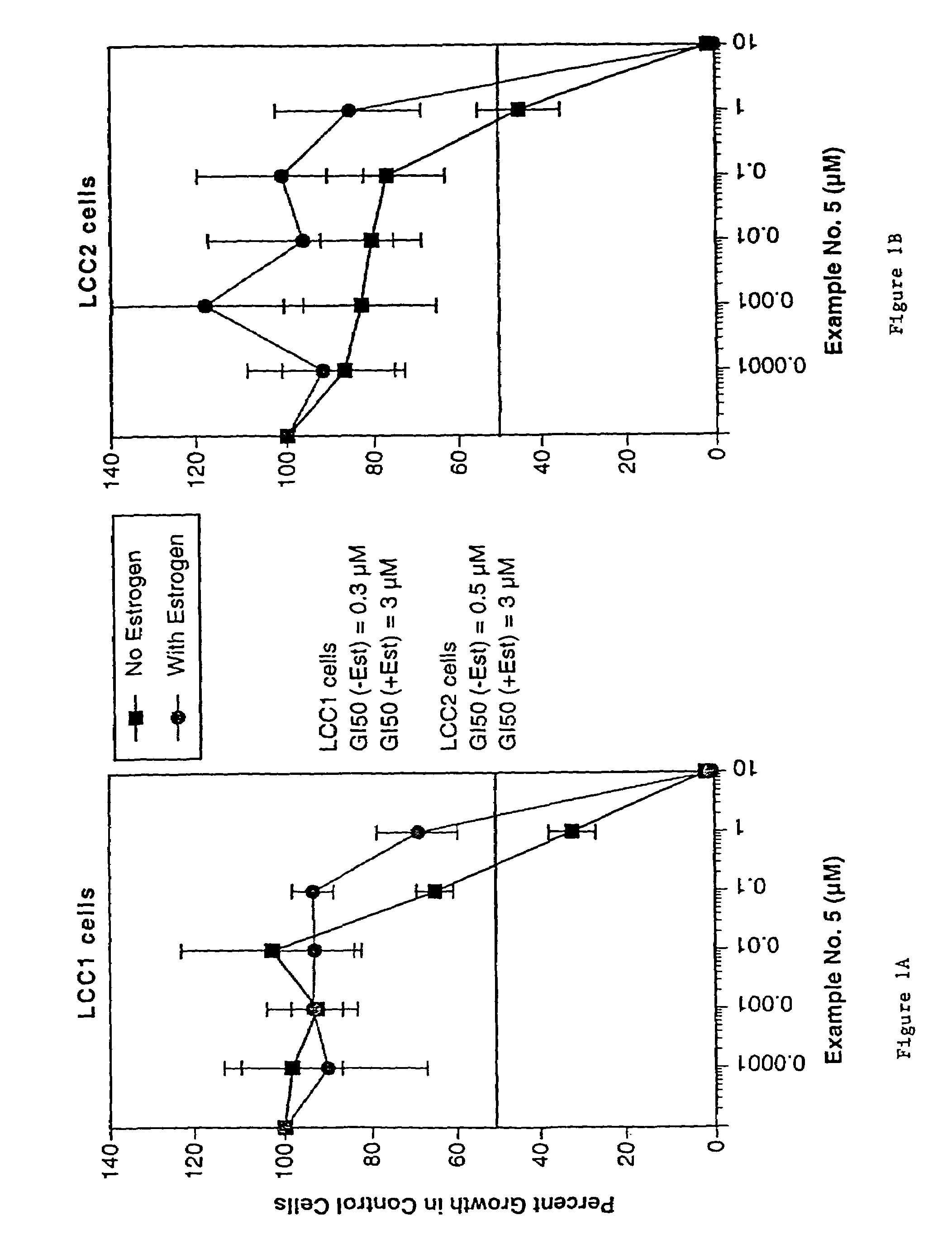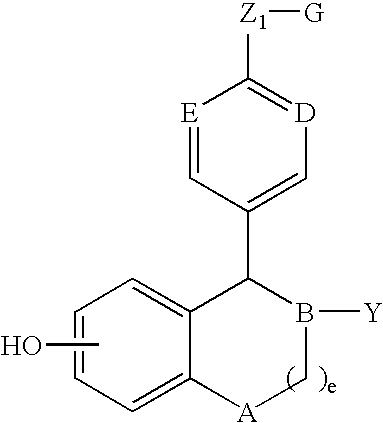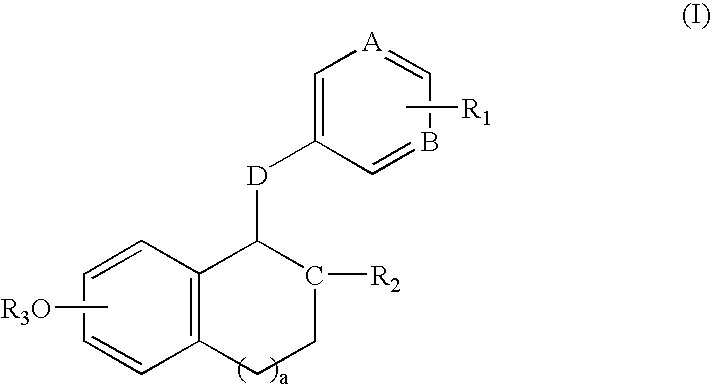Compounds and methods for modulation of estrogen receptors
a technology of estrogen receptors and compounds, applied in the field of compounds and methods for modulating estrogen receptors, can solve the problems of increasing cancer risk, ligand-binding assays traditionally used in screening for novel er modulators have not distinguished between tissue selectivity and agonist/antagonist behavior, and the results are controversial. , to achieve the effect of different side-effect profiles and significant clinical utility
- Summary
- Abstract
- Description
- Claims
- Application Information
AI Technical Summary
Benefits of technology
Problems solved by technology
Method used
Image
Examples
example 1
SYNTHESIS OF 1-(4-BROMOBENZYL)-6-METHOXY-2-PHENYL-1,2,3,4TETRAHYDROISOQUINOLINE
A. 2-(3-Methoxyphenyl)-N-phenylacetamide
To a solution of 3-methoxyphenylacetyl chloride (2.3 g, 12.5 mmol) in ethyl acetate (30 mL) was added a solution of aniline (1.16 g, 12.5 mmol) in ethyl acetate (30 mL). After 3 hours, the reaction was poured into water (50 mL). The organic layer was separated, dried over MgSO4, filtered and concentrated to provide the title compound (2.67 g, 89% yield): EI-MS (m / z) 241.
B. {2-(3-Methoxyphenyl)ethyl}phenylamine
To a solution of 2-(3-methoxyphenyl)-N-phenylacetamide (2.0 g, 8.3 mmol) in anhydrous tetrahydrofuran (30 mL) under nitrogen was added lithium aluminum hydride (1.59 g, 42 mmol) in small portions over a 1 hour period. After 16 hours, the reaction was poured over ice and the crude product extracted with ethyl acetate (2×100 mL). The organic layer was dried over MgSO4, filtered and concentrated to provide the title compound (1.3 g, 69% yield): EI-MS (m / z) 227.
C. ...
example 2
SYNTHESIS OF 1-(4-BROMOBENZYL)-2PHENYL-1,2,3,4-TETRAHYDROISOQUINOLIN-6-OL
To a solution of 1-(4-bromobenzyl)-6-methoxy-2-phenyl-1,2,3,4-tetrahydroisoquinoline (0.10 g, 0.25 mmol) in CH2Cl2 (15 mL) at 0° C. under nitrogen was added boron tribromide (1.47 mL, 1.47 mmol). The reaction was allowed to reach RT. After 8 hours, the reaction was poured into water (10 mL) and neutralized with saturated sodium bicarbonate. Additional CH2Cl2 (25 mL) was added, the organic layer was separated, dried over MgSO4, filtered and concentrated. The residue was then chromatographed (SiO2, 2:1, hexanes / ethyl acetate) to provide the title compound (0.010 g, 10% yield): 1H NMR (CDCl3) 7.33 (d, 2H), 7.24 (dd, 2H), 6.97 (d, 1H), 6.88 (d, 2H), 6.80 (d, 2H), 6.75 (dd, 2H), 6.66 (m, 1H), 6.27 (s, 1H), 4.78 (t, 1H), 3.53 (m 2H), 3.13 (dd, 1H), 2.96 (m, 2H), 2.62 (m, 1H); ES-MS (m / z) 392 [M−H]−.
example 3
SYNTHESIS OF 2-PHENYL-1-{4-[(2-PIPERIDYL)ETHOXY]BENZYL}-1,2,3,4-TETRAHYDROISOQUINOLIN-6-OL
A. N-{2-(3-Methoxyphenyl)ethyl}-N-phenyl-2-{4-(phenylmethoxy)phenyl}acetamide
The title compound was prepared as described in Example 1.C, using 4-benzyloxyphenylacetyl chloride (2.28 g, 8.27 mmol) prepared from the corresponding carboxylic acid (2.0 g, 8.27 mmol) and oxalyl chloride (5.25 mL, 41.4 mmol) in CH2Cl2 (50 mL) (3.36 g, 90% yield): ES-MS (m / z) 452 [M+H]+.
B. 1-{4-(Phenylmethoxy)benzyl}-6-methoxy-2-phenyl-1,2,3,4-tetrahydroisoquinoline
The title compound was prepared as described in Example 1.D, using N-{2-(3-methoxyphenyl)ethyl}-N-phenyl-2-{4-(phenylmethoxy)phenyl}acetamide (0.5 g, 1.11 mmol) to afford the title compound (0.19 g, 39% yield): ES-MS (m / z) 436 [M+H]+.
C. 1-(4-Hydroxybenzyl)-6-methoxy-2-phenyl-1,2,3,4-tetrahydroisoquinoline
A solution of 1-{4-(phenylmethoxy)benzyl}-6-methoxy-2-phenyl-1,2,3,4-tetrahydroisoquinoline (0.60 g, 1.38 mmol), palladium (5% wt. oil activated carbon, 0...
PUM
| Property | Measurement | Unit |
|---|---|---|
| structure | aaaaa | aaaaa |
| bone density | aaaaa | aaaaa |
| affinity | aaaaa | aaaaa |
Abstract
Description
Claims
Application Information
 Login to View More
Login to View More - R&D Engineer
- R&D Manager
- IP Professional
- Industry Leading Data Capabilities
- Powerful AI technology
- Patent DNA Extraction
Browse by: Latest US Patents, China's latest patents, Technical Efficacy Thesaurus, Application Domain, Technology Topic, Popular Technical Reports.
© 2024 PatSnap. All rights reserved.Legal|Privacy policy|Modern Slavery Act Transparency Statement|Sitemap|About US| Contact US: help@patsnap.com










